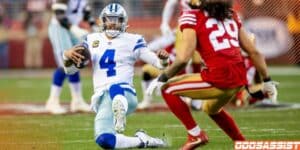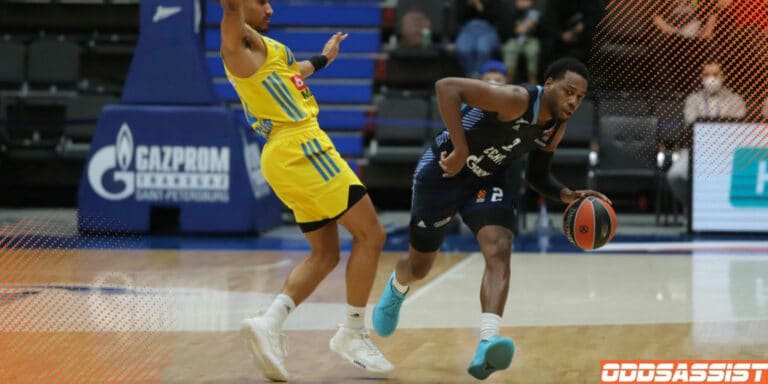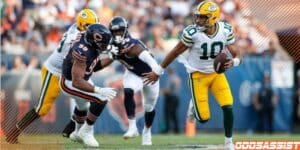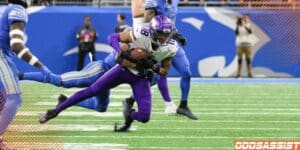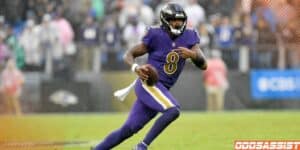Companies featured on this page may be our partners who compensate us if you sign up for one through our links. This doesn't affect our ratings or opinions in any way. Must be 21+. Gambling Problem? Call 1-800-GAMBLER. See full disclosure.
To be a successful sports bettor, you have to understand the different types of sports bets available.
As sportsbooks continue to offer more and more types of wagers, it can be hard to stay on top of all the options available to you.
This guide explains the different types of sports bets so you know exactly what you are betting on when you go to (or log onto) your sportsbook.
1) Spread bets
Spread bets are the first type of “straight bet” and are the most common type of sports bet. With these, you choose a team along with a number (the spread) that dictates how many points that team has to either win by or lose less than by.
It’s a bit hard to explain, but it’s actually really simple, so let’s take a look at an example.
Say the Eagles and Cowboys are playing. The lines say Eagles -3.5 and Cowboys +3.5. This means that the Eagles must win by 4 points or more in order to cover the spread. The Cowboys must either win or lose by 3 points or less in order to cover.
A positive sign indicates that the team is the underdog while a negative sign is for the favorite.
Note that if the final result of a game lands on exactly the spread (such as if Lakers are -10 and win by exactly 10 points), then the bet is a push and you will be refunded the money you wagered.
The standard odds for spread bets is -110 (learn how to read betting odds here). If a lot of money comes in on one team, the odds may shift towards -120. If enough money comes in, the sportsbook may change the spread by a half point (such as moving the Eagles from -3.5 to -4 in the example above).
There are also alternate spreads which allow bettors to move the line in either direction in exchange for better or worse odds depending on which direction they move it.
>> Read More: How Spread Betting Works
2) Moneyline bets
Betting the moneyline—the second type of straight bet—is simply picking a team to win the game—sometimes called “straight up.” Since there is no spread involved in moneyline bets, their odds have a much larger range than spread bets.
Depending on how large of a favorite a team is, you may see their odds be as low as -1000 (1/10). If two teams are evenly matched in Vegas’ eyes, then you may see their odds at even money (-110 when including the vig—what the sportsbook charges to take your bet).
Using the same example above, you may see the Eagles at -200 (the favorite) and the Cowboys at +165 (the underdog).
You’ll always see that the absolute value of the negative number is larger than the positive number because of the vig that sportsbooks charge. If the odds were simply -200 and +200, the sportsbook would make no money.
Note that there are also, three-line moneyline bets in sports like soccer and hockey that allow you to also choose among either team to win or the game to end in a tie.
>> Read More: How Moneyline Betting Works
Offers from our partners
3) Total bets (Over/Under)
Total bets are the final kind of straight bet and are often referred to as the “Over/Under.”
With these, you simply choose whether the final score of the game will be over or under a certain number.
Like spread bets, you will most often see total bets with lines of around -110, the total may move up or down as wagers come in, and your bet pushes if it lands exactly on the total.
Back to the Eagles vs. Cowboys example used above, let’s say the total is 44.5. If the final score is 27-24, the total points scored would be 51 and the Over would hit. If the final score is 17-14, the total points scored would be 31 and the Under would hit.
Like with spreads, there are also alternate totals that allow you to move the total up or down in exchange for a better or worse payout depending if you move the line or against your favor.
>> Read More: Total (Over/Under) Betting Guide
4) Parlays
A parlay is when you group multiple bets into a single wager. In order for the parlay to payout, each individual bet (called a “leg”) must win.
Since you only win if all the legs of the parlay hit, you receive a much higher payout than you would if you made each bet individually.
For example, a 4-team parlay in which leg has -110 odds, the final odds would be around +1228—much higher than the payout would be if you just bet each leg on its own.
You can use our Parlay Calculator to calculate parlay payouts based on each leg's odds or use the following table that shows the standard payouts on parlays in which each leg has -110 odds:
# Parlay Legs | Implied Probability | Odds |
|---|---|---|
2 | 27.44% | +264 |
3 | 14.37% | +596 |
4 | 7.53% | +1228 |
5 | 3.94% | +2436 |
6 | 2.07% | +4741 |
7 | 1.08% | +9142 |
8 | 0.57% | +17545 |
9 | 0.30% | +33585 |
10 | 0.16% | +64208 |
People often parlay different games from the same sport, but it’s possible to create cross-sport parlays too. For example, you may have a 5-team parlay that includes the Eagles, Chiefs, Lakers, Yankees, and Flyers.
You can even usually parlay futures bets too. For example, you could parlay the Chiefs, Lakers, and Yankees all to win their respective championships.
>> Read More: Parlay Betting Guide
Same game parlays
Recently, many sportsbooks—such as FanDuel, bet365, and BetMGM—have started offering “same game parlays” or something similarly named.
Though each sportsbook has its own terminology for them, they are essentially parlays that allow you to include the spread or moneyline, total, game props, and/or player props from the same game.
The key differentiator from what I call “true” same game parlays (which few sportsbooks offer) and parlays just including the spread/moneyline and total from the same game (which most sportsbooks offer) is the ability to include prop bets.
Here is a same game parlay I bet on FanDuel earlier this year:
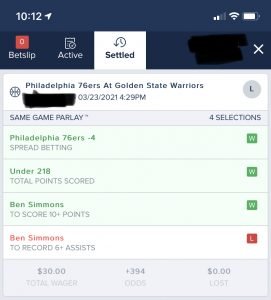
>> Read More: Sportsbooks That Offer Same Game Parlays
5) Prop bets
Prop bets (short for “proposition bets”) are bets that aren’t based on the final score of the game. If the bet isn’t a spread, total, or moneyline bet, it is typically considered a prop bet.
Most sportsbook offer countless prob bets on popular games. These may include things like how many points a player will score, how many rushing yards a running back will have, or how many interceptions a team will have.
Game props
Game props are any prop bet that doesn’t involve a specific player. Instead, game props often include the entire team or both teams. Some examples are the total amount of turnovers, which team will score first, and if there will be a safety or not.
Player props
As the name implies, player props involve specific players. Player props are related to the stats of a specific player. Some examples include total passing/rushing/receiving yards, first touchdown scorer, and to record a triple-double.
>> Read More: Prop Bets Guide
6) Teasers
Teasers are parlays with the lines adjusted by a certain number of points in your favor in exchange for a lower payout as compared to a standard parlay.
For example, many sports bettors create 6-point teasers with NFL spread bets. Instead of having the Patriots -7, they would be teased down to -1. Instead of the Bears being +4, they would be teased to +10.
It’s also possible to tease totals, but teasers involving spreads are more common.
Many sportsbooks allow you to create teasers directly from the betslip. If yours does, simply select the standard lines you want to tease and look for the teaser button in the betslip.
>> Read More: Teasers Betting Guide
7) Reverse teasers (also called “pleasers”)
Reverse teasers, or “pleasers”, are the opposite of teasers. Instead of having lines adjusted in your favor, they are adjusted against your favor in exchange for a higher payout as compared to a standard parlay.
Using the same example above, one leg of a reverse teaser would be the Patriots -13 instead of -7 and another would be the Bears -2 instead of +4.
>> Read More: Pleasers/Reverse Teasers Betting Guide
8) Round robin bets
Round robin bets work just like round robin tournaments. You first pick all of the wagers you are interested in—say A, B, and C.
The sportsbook or sports betting app will then automatically create 3 two-team parlays:
- A + B
- A + C
- B + C
If you include 4 bets in your round robin, you could decide between doing 6 two-team parlays or 4 three-team parlays.
When you enter the amount you want to bet on a round robin in the betslip, it’s usually for each parlay. So, if you are doing the first example with teams A, B, and C and enter $5 into the bet slip, the total cost would be $15 ($5 wagered on 3 parlays).
>> Read More: Round Robin Betting Guide
9) Futures bets
Futures bets are bets on future events such as who will win a championship or division, the total amount of wins a team will have in the upcoming season, or who will win the MVP.
It’s especially important to shop around for the best lines when placing futures bets as these tend to vary much more than straight bets.
>> Read More: Futures Betting Guide
10) Head-to-head bets
Head-to-head bets are based on select participants in a game as opposed to the entire field.
For example, instead of choosing the outright winner of the Masters, you may choose who will finish better between Jordan Spieth and Brooks Koepka.
You may also see head-to-head bets involving who will pass for more yards, have more strikeouts, or score more goals.
11) If bets
If bets are less common than the other type of bets listed on this page, so much so that I have yet to see any listed in U.S. sportsbooks.
Though they are less popular, they are pretty straightforward.
Essentially, if bets are just a succession of bets that are only placed if the previous bet wins. Say, for example, you pick the Eagles, 49ers, and Seahawks which each play at a different time on one Sunday.
Only if the Eagles bet hits will the 49ers bet be placed. Then, only if the 49ers bet hits will the Seahawks bet be placed.
Note that each bet is treated as an independent bet—not as a parlay. So if you win the Eagles bet but the 49ers bet loses, you will still be paid out for the Eagles.
Other Types of Sports Bets & Terminology
Here are some other guides we have that go over specific types of sports bets:

